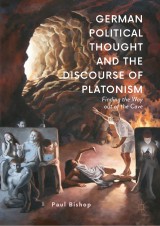Details

German Political Thought and the Discourse of Platonism
Finding the Way Out of the Cave|
CHF 118.00 |
|
| Verlag: | Palgrave Macmillan |
| Format: | |
| Veröffentl.: | 18.01.2019 |
| ISBN/EAN: | 9783030045104 |
| Sprache: | englisch |
Dieses eBook enthält ein Wasserzeichen.
Beschreibungen
Taking Plato’s allegory of the cave as its starting-point, this book demonstrates how later European thinkers can be read as a reaction and a response to key aspects of this allegory and its discourse of enchainment and liberation. Focusing on key thinkers in the tradition of European (and specifically German) political thought including Kant, Marx, Hegel, Nietzsche, Heidegger, and the Frankfurt School, it relates them back to such foundational figures as Rousseau, Aristotle, and in particular Plato. All these thinkers are considered in relation to key passages from their major works, accompanied by an explanatory commentary which seeks to follow a conceptual and imagistic thread through the labyrinth of these complex, yet fascinating, texts. This book will appeal in particular to scholars of political theory, philosophy, and German language and culture.<div><br></div><div><br></div>
<div>Chapter 1: What is politics?.- Chapter 2: Plato and the cave.- Chapter 3: Aristotle and the empirical approach.- Chapter 4: Rousseau and the social contract.- Chapter 5: Kant and the categorical imperative.- Chapter 6: Hegel and the dialectic.- Chapter 7: Marx & Engels: the revolution.- Chapter 8: Nietzsche & Heidegger: a glance to the Right.- Chapter 9: The Frankfurt School — Adorno & Horkheimer.- Chapter 10: Habermas and communicative action.- Chapter 11: By Way of Conclusion.<br></div><div><br></div><div><br></div><div><br></div>
<b>Paul Bishop </b>is William Jacks Chair of Modern Languages at University of Glasgow, UK. His previous publications include <i>Carl Jung</i> (2014), <i>A Companion to Friedrich Nietzsche, Life and Works</i> (2012), and <i>Nietzsche and Antiquity: His Reaction and Response to the Classical Tradition</i> (2004).
<div><p>Taking Plato’s allegory of the cave as its starting-point, this book demonstrates how later European thinkers can be read as a reaction and a response to key aspects of this allegory and its discourse of enchainment and liberation. Focusing on key thinkers in the tradition of European (and specifically German) political thought including Kant, Marx, Hegel, Nietzsche, Heidegger, and the Frankfurt School, it relates them back to such foundational figures as Rousseau, Aristotle, and in particular Plato. All these thinkers are considered in relation to key passages from their major works, accompanied by an explanatory commentary which seeks to follow a conceptual and imagistic thread through the labyrinth of these complex, yet fascinating, texts. This book will appeal in particular to scholars of political theory, philosophy, and German language and culture.</p>
<p><b>Paul Bishop </b>is William Jacks Chair of Modern Languages at University of Glasgow, UK. His previous publications include <i>Carl Jung</i> (2014), <i>A Companion to Friedrich Nietzsche, Life and Works</i> (2012), and <i>Nietzsche and Antiquity: His Reaction and Response to the Classical Tradition</i> (2004). </p></div><div><br></div>
<p><b>Paul Bishop </b>is William Jacks Chair of Modern Languages at University of Glasgow, UK. His previous publications include <i>Carl Jung</i> (2014), <i>A Companion to Friedrich Nietzsche, Life and Works</i> (2012), and <i>Nietzsche and Antiquity: His Reaction and Response to the Classical Tradition</i> (2004). </p></div><div><br></div>
Presents an engaging and original exploration of German political thought in relation to Plato’s seminal allegory of the cave Examines the relation between the individual and society, the primacy of the economic, our engagement with the material world, the notion of the contract, and the function of the state Opens up arguments about Plato and his influence on Western political thought
Diese Produkte könnten Sie auch interessieren:

The Enigma of Good and Evil: The Moral Sentiment in Literature

von: Anna-Teresa Tymieniecka

CHF 354.00















